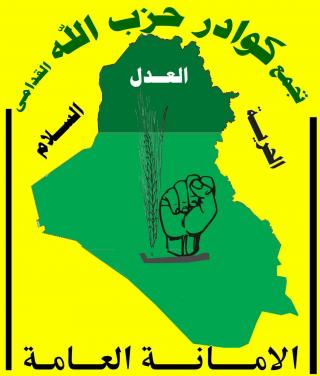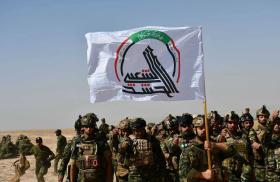
Distinguishing Kawader Hezbollah al-Qudama and Kataib Hezbollah

Nouri al-Maliki is gathering various Iraqi resistance figures who fought both Saddam and the coalition, but this marginal "old timer" party is not the same as Kataib Hezbollah, which has yet to show its hand in parliamentary politics.
On April 30, 2021, former prime minister Nouri al-Maliki’s State of Law list announced that it will participate in Iraq's planned October general election as a coalition of eight parties. Two of these parties include the term "Hezbollah" in their names: Kawader Hezbollah al-Qudama (Old-Timer Hezbollah Cadres, or KHQ), and Hezbollah al-Iraq (Iraqi Party of God, or HI). Though widely assumed to represent the top Iran-backed militia Kataib Hezbollah (KH), these parties actually comprise muqawama (resistance) elements who battled the forces of Saddam Hussein and the United States even before the formation of KH.
Partnering with these small and not especially popular "old timers" indicates that Maliki has been reduced to grasping whatever militia alliances he can find in order to regrow his political influence. It also underlines the strengthening alignment between Maliki—the institutional godfather of the muqawama since around 2012—and today's muqawama politicians.
For example, KHQ is headed by Jabbar Jasim Wajid al-Musawi (Figure 2), a militant commander who fought Saddam's forces in the southern al-Ahwar marshes. In 1994, he and Abu Hatim al-Muhammadawi, the so-called "Prince of the Marshes," established Hezbollah al-Iraq. HI's areas of operation were the marshes of Maysan and Dhi Qar. Other militant groups affiliated with parties such as Dawa fought alongside HI, relying on a secure rear area in Iran and supplies from the Islamic Revolutionary Guard Corps (IRGC).
After Saddam's fall, Musawi and other Ahwar-based HI fighters went back to his hometown in Dhi Qar and established their political movement. Musawi kept his relationship with his old comrades, who included the late KH leader Abu Mahdi al-Muhandis (Figure 3).
Musawi has been described at various points as the secretary-general of different movements using the prestigious Hezbollah name. These include:
- Hezbollah al-Iraq, which is now headed by Ahmad Kadhim Mohammad as a political party within the State of Law coalition.
- Saraya Hezbollah (Companies of Hezbollah), the first regiment of the 7th Brigade (Liwa al-Muntadher) in the Popular Mobilization Forces (PMF).
- Harakat Mujahedin al-Ahwar li Hezbollah (Movement of Hezbollah’s Ahwar Mujahedin, or HMAH).
Some Hezbollah old-timers consider themselves to be part of an Iraqi movement, while others think of themselves as members of the transnational Hezbollah movement. A 2017 message posted on the KHQ Telegram channel highlights this division. When one admin posted an image (Figure 4) in which the name "KHQ-Iraq" was mentioned, another admin responded, “My brother, correct the title, [it’s] KHQ only, delete ‘Iraq.’” KHQ has also suggested a very close affinity with Lebanese Hezbollah through its placement of the latter's flags in many key photos.
Musawi has had political ambitions for a long time. In 2010, he ran with the National Iraqi Alliance as the secretary-general of HMAH. In 2014, he ran with Maliki’s State of Law Alliance (Figure 5).
In the 2018 general election, Musawi chose the Fatah Alliance but only managed to secure a dismal 64 votes (Figure 6). He had better luck in the provincial election, securing a seat in Dhi Qar and becoming the head of the provincial council's security committee.
Musawi is accused of having a hand in killing protestors in Dhi Qar on October 26, 2019. An arrest warrant was issued, and a judge ordered that his properties be confiscated. Authorities mentioned these orders as late as August 2020, but this did not prevent him from running for election.
Why does Maliki want to include such an unpopular and notorious character in his coalition? Under the new electoral system, Maliki can no longer count on his name recognition winning enough votes to "spill over" and get other candidates into parliament. He also wants to maintain a degree of autonomy and not be folded entirely within some other leader's list (i.e., Fatah). Hence, he is seemingly choosing to be the biggest fish in a small pond, working with small muqawama partners like KHQ. Yet this is not the same as Maliki allying with KH. Nor has KH openly joined an electoral bloc; for the time being, the group remains outside conventional party politics.
Maliki and Kataib Hezbollah
Although State of Law's new partners are not KH organs, it is correct to say that KH has been building a warm relationship with Maliki. The militia has been promoting Maliki in recent months, and the feeling is apparently mutual. For example, KH’s al-Etejah TV recently broadcast a documentary in which Maliki praised "KH’s bravery." The program also presented him as the one who established the PMF, something he repeats whenever he finds an opportunity as a way of boosting his profile (Figure 7).
Such praise of Maliki may indicate that the broader Hezbollah movement in Iraq—including KH, which has never run its own list in elections—is moving at least partially away from the Fatah Alliance, which consists of other Iran-backed militias.











